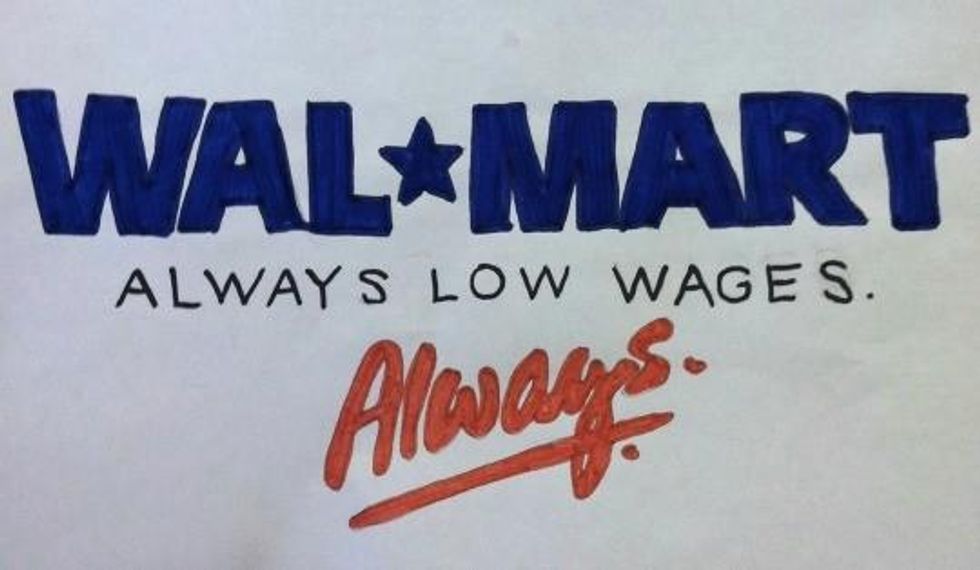

SUBSCRIBE TO OUR FREE NEWSLETTER
Daily news & progressive opinion—funded by the people, not the corporations—delivered straight to your inbox.
5
#000000
#FFFFFF
To donate by check, phone, or other method, see our More Ways to Give page.


Daily news & progressive opinion—funded by the people, not the corporations—delivered straight to your inbox.

Walmart, the nation's largest private employee, is notorious for paying poverty wages to its workeforce while refusing calls for better treatment of employees and aggressively blocking efforts at unionization.
According to the Guardian, "Walmart has 1.3 million US employees, about 4,000 of whom currently make either a state or federal minimum wage."
From Bloomberg:
Wal-Mart is weighing the impact of additional payroll costs against possibly attracting more consumer dollars to its stores, David Tovar, a company spokesman, said [...] in a telephone interview. Increasing the minimum wage means that some of the 140 million people who shop at the chain weekly would "now have additional income," Tovar said.
Subsequently, and responding to questions about whether the company would support or resist a renewed push by Democrats on Capitol Hill and the Obama administration to raise the national minimum wage to $10.10, Tovar said: "That's something we're looking at. Whenever there's debates, it's not like we look once and make a decision. We look a few times from other angles."
But, seemingly eager to back off even that mild statement, a second Walmart representative said Tovar's comments had been taken out of context and told the Guardian: "We are looking at it, as you would expect any large company. That does not mean we have changed our position."
______________________________________
Dear Common Dreams reader, The U.S. is on a fast track to authoritarianism like nothing I've ever seen. Meanwhile, corporate news outlets are utterly capitulating to Trump, twisting their coverage to avoid drawing his ire while lining up to stuff cash in his pockets. That's why I believe that Common Dreams is doing the best and most consequential reporting that we've ever done. Our small but mighty team is a progressive reporting powerhouse, covering the news every day that the corporate media never will. Our mission has always been simple: To inform. To inspire. And to ignite change for the common good. Now here's the key piece that I want all our readers to understand: None of this would be possible without your financial support. That's not just some fundraising cliche. It's the absolute and literal truth. We don't accept corporate advertising and never will. We don't have a paywall because we don't think people should be blocked from critical news based on their ability to pay. Everything we do is funded by the donations of readers like you. Will you donate now to help power the nonprofit, independent reporting of Common Dreams? Thank you for being a vital member of our community. Together, we can keep independent journalism alive when it’s needed most. - Craig Brown, Co-founder |

Walmart, the nation's largest private employee, is notorious for paying poverty wages to its workeforce while refusing calls for better treatment of employees and aggressively blocking efforts at unionization.
According to the Guardian, "Walmart has 1.3 million US employees, about 4,000 of whom currently make either a state or federal minimum wage."
From Bloomberg:
Wal-Mart is weighing the impact of additional payroll costs against possibly attracting more consumer dollars to its stores, David Tovar, a company spokesman, said [...] in a telephone interview. Increasing the minimum wage means that some of the 140 million people who shop at the chain weekly would "now have additional income," Tovar said.
Subsequently, and responding to questions about whether the company would support or resist a renewed push by Democrats on Capitol Hill and the Obama administration to raise the national minimum wage to $10.10, Tovar said: "That's something we're looking at. Whenever there's debates, it's not like we look once and make a decision. We look a few times from other angles."
But, seemingly eager to back off even that mild statement, a second Walmart representative said Tovar's comments had been taken out of context and told the Guardian: "We are looking at it, as you would expect any large company. That does not mean we have changed our position."
______________________________________

Walmart, the nation's largest private employee, is notorious for paying poverty wages to its workeforce while refusing calls for better treatment of employees and aggressively blocking efforts at unionization.
According to the Guardian, "Walmart has 1.3 million US employees, about 4,000 of whom currently make either a state or federal minimum wage."
From Bloomberg:
Wal-Mart is weighing the impact of additional payroll costs against possibly attracting more consumer dollars to its stores, David Tovar, a company spokesman, said [...] in a telephone interview. Increasing the minimum wage means that some of the 140 million people who shop at the chain weekly would "now have additional income," Tovar said.
Subsequently, and responding to questions about whether the company would support or resist a renewed push by Democrats on Capitol Hill and the Obama administration to raise the national minimum wage to $10.10, Tovar said: "That's something we're looking at. Whenever there's debates, it's not like we look once and make a decision. We look a few times from other angles."
But, seemingly eager to back off even that mild statement, a second Walmart representative said Tovar's comments had been taken out of context and told the Guardian: "We are looking at it, as you would expect any large company. That does not mean we have changed our position."
______________________________________